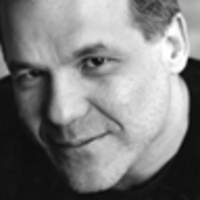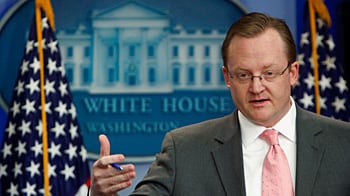
It’s become commonplace both to praise and to criticize Obama and his team for playing hardball Chicago-style politics. But Robert Gibbs, the president’s press secretary, could use some schooling in one of street-fighting’s most fundamental rules: Don’t take the bait.
It doesn’t matter whether a reporter is from ABC News or Fox News, Gibbs will sink to the occasion.
Though it was Obama’s cool and poise, along with his endlessly reiterated promise to heal a “divided” country that helped get him elected, his press secretary—the president’s human face, as it were—is perplexingly arrogant and thin-skinned.
“Let’s be honest,” Gibbs told a startled press conference a few days ago, in response to a question about Obama’s town-hall appearances, “some of you were disgusted the president didn’t get yelled at.” A few months earlier, replying to a question about pork in the massive stimulus bill, Gibbs lectured the assembled reporters: “There is a great tendency, and we've done this over the last few days in this room, to try to figure out what the score of the baseball game is after the third inning, OK?”
All the contemptuous sneers at the media during the Bush years have now come home to roost in the mouth of the man who represents the very person who ran vowing to overturn the mendacity of the Bush administration—and who was elected, in part, because a shamed media rose to protect him.
It doesn’t matter whether a reporter is from ABC News or Fox News, Gibbs will sink to the occasion—he is as antagonistic to the former’s Jake Tapper as to the latter’s Major Garrett. Indeed, one of the most curious results of Gibbs’ Sarcast-athons is to create in both Tapper and Garrett identical facial expression while jousting with the press secretary: somewhere between stony and clenched, their professional pride ready to burst or pounce.
And instead of calmly, rationally responding to the extremists assaulting Obama’s health-care plans, Gibbs lends his prestigious platform to their cause. He seems unaware that by loudly dismissing the opposition as “nuts,” he is not only making the lunatic fringe part of the respectable discourse, but he is associating legitimate criticism of the plan with that fringe. Gibbs seems not to realize that by raising Rush Limbaugh, a revolutionary type of male bimbo—in Italy, Limbaugh would not be a political “commentator” but a cigar-chomping blonde sitting on Berlusconi’s knee—to press-conference level, he is inspiring Limbaugh’s hordes to think they have the president’s ear.
White House press secretaries are often chosen for the contrapuntal statement they make with regard to the president, even as they help project his identity. Whereas Nixon seemed to be born as a middle-aged man, Ron Ziegler was boyishly handsome—he was what Nixon should have looked like in his ill-starred television debate with JFK. Dee Dee Myers was the estrogen-driven answer to the testosterone-driven Clinton. Poor Gibbs, on the other hand, resembles that uptight white academic many people feared was inside Obama just bursting to get out. He doesn’t just wear his glasses. He seems implacably bespectacled—admonitory even in his flippant asides.
Never mind Tony Snow’s role as the face of a criminally stupid regime: He was dignified, elegant and courtly where the man he spoke for, President George W. Bush, was crass, crude, and abrupt. Go on YouTube and compare Snow’s duel with NBC’s David Gregory over the question of success in Iraq to Gibbs’ recent fracas with CBS’s Chip Reid over what Reid claimed was the staged aspect of Obama’s town halls. Snow is forceful, even provocative with Gregory, but never for an instant tramples on Gregory’s dignity or insults his intelligence. Gibbs, by jolting contrast, is smug, sardonic, and lacking in self-control as he slides into defiant, snide babble, rather than—at least you can respect it—terpsichorean evasion. You could not imagine him apologizing to Reid as Snow gallantly did to Gregory (let alone to Helen Thomas, who to my mind has the stature of a Murrow but is treated by our gerontophobic culture as a kind of Scrooge).
It may well be that Gibbs—along with Rahm Emanuel—is still running on the adrenalin of the campaign and can’t relinquish the aggressiveness that was so effective in getting Obama to the White House. But even more, he seems to embody all the self-righteousness that the righteous indignation of the Bush years has curdled into. His knowing, cynical attitude toward the press is the mirror image of the entire industry of knowing cynicism that Bush-hatred produced. We knew Bush was lying before he opened his mouth. Gibbs knows the people in the pressroom are posturing before they raise their hands.
This iron certitude has been Obama’s bane since he became a public figure. He knows he’s right—for all his heroic determination to get the country universal health-care, at the town-hall debates his shoulders visibly sag and he just perceptibly tunes out when the audience “doesn’t get it.” It is the inveterate teacher’s exasperation with unteachable students.
Still, in the shadow of presidential authority, the candidate’s ego does not seem so obtrusive. Obama’s slightest self-deprecation is powerfully charming when it emanates from such powerful precincts. Not so with Gibbs. His bursts of ego undo every display of Obama’s modesty. Rather than being a corrective to the president’s faltering public image, Gibbs is an irritant that hastens it along. Obama’s health-care legislation needs a new course of treatment, and one phase of that should be to unhook Gibbs from the old Chicago machine, and bring in someone who knows how to make peace, even as his boss is (tactfully, one hopes) making war.
Lee Siegel has written about culture and politics and is the author of three books: Falling Upwards: Essays in Defense of the Imagination; Not Remotely Controlled: Notes on Television; and, most recently, Against the Machine: Being Human in the Age of the Electronic Mob. In 2002, he received a National Magazine Award for reviews and criticism.






